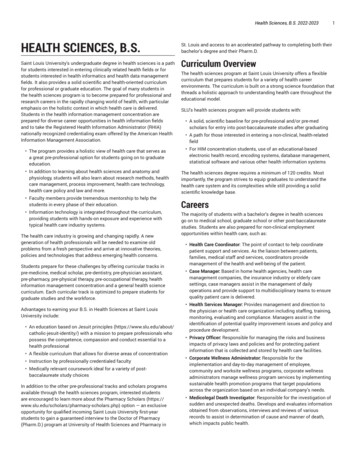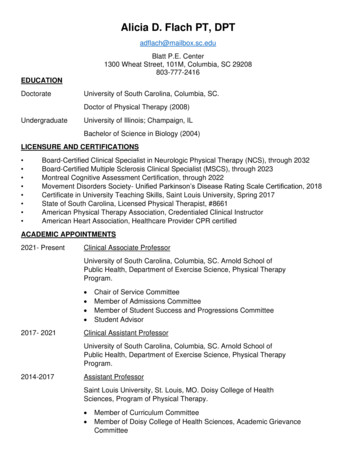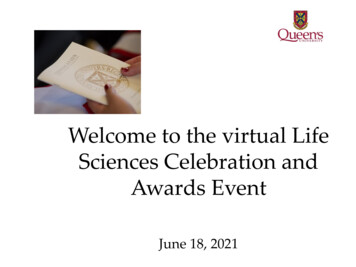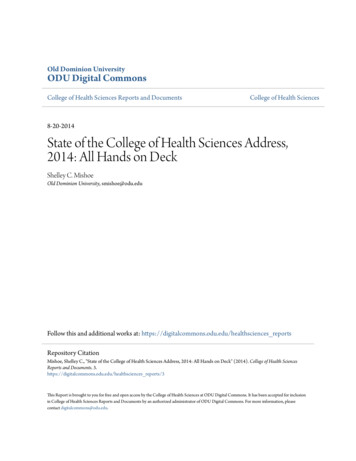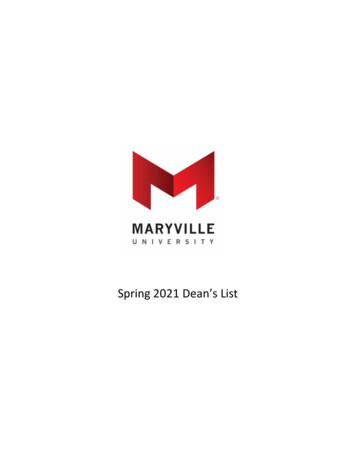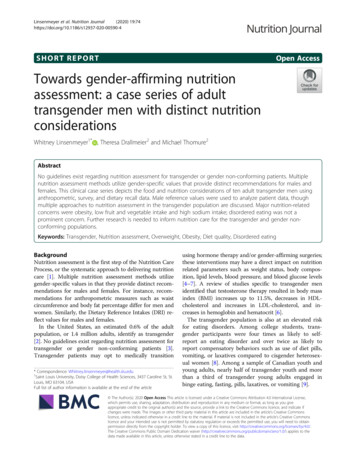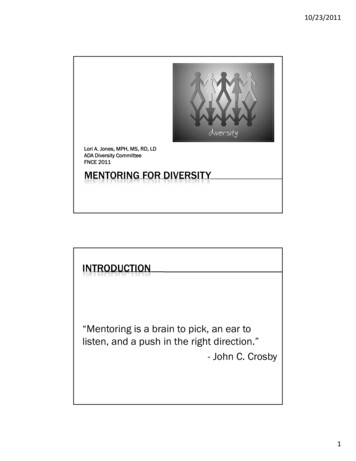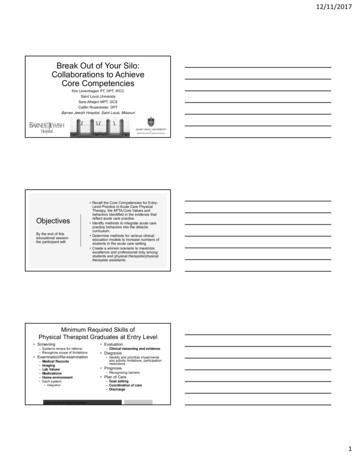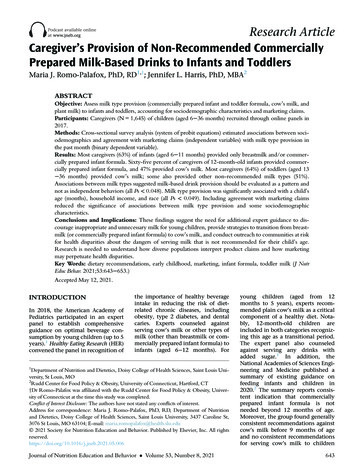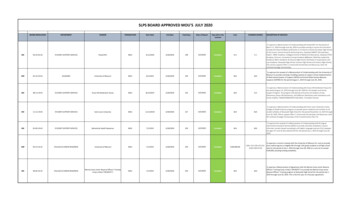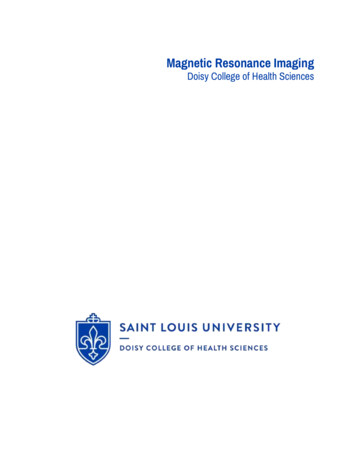
Transcription
Magnetic Resonance ImagingDoisy College of Health Sciences
Table of ContentsPage 2 . Accreditation InformationPage 3 . Program Mission, Goals and Student Learning OutcomesPage 4 . Program Outcomes and Effectiveness DataPage 6 . Clinical Obligations and Clinical SitesPage 8 . Technical StandardsPage 10 . Additional Fees and RequirementsPage 12 .Admission Policy and GradingPage 14 .Grievance ProcedureAppendix Student Learning Outcomes Table1 Page
AccreditationThe Magnetic Resonance Imaging Program at Saint Louis University is accredited by the Joint ReviewCommittee on Education in Radiologic Technology (JRCERT), in cooperation with the American College ofRadiology (ACR) and the American Society of Radiologic Technologists (ASRT).The MRI Program has an advisory committee consisting of clinical instructors, managers, and directors inthe healthcare profession. The committee contributes recommendations for enhancing the program as wellas assessment of the program.For further information on the Joint Review Committee on Education in Radiologic Technology, or to viewthe program’s current accreditation status, go tohttps://www.jrcert.org/.Joint Review Committee on Education in Radiologic Technology20 N. Wacker Drive, Suite 2850Chicago, IL 60606312-704-5300mail@jrcert.org2 Page
Program Mission and GoalsProgrammatic Mission:The Magnetic Resonance Imaging Program at the Saint Louis University Doisy College of Health Sciencesis dedicated to preparing liberally educated, competent, caring and socially responsible MagneticResonance Imaging Technologists, committed to clinical and scholarly excellence.Magnetic Resonance Imaging Program Goals: Goal A: Students will be clinically competent1. Students will appropriately use, record, and verify patient data2. Students will position patients as directed3. Students will use the proper imaging sequences4. Students practice proper MRI and patient safetyGoal B: The students will demonstrate problem solving and critical thinking skills1. Students will complete imaging procedures, explaining steps in detail2. Students will present case studies and MRI final capstone project.Goal C: Students will demonstrate effective communication skills1. The student will appropriately communicate with patients2. The student will demonstrate appropriate written communication3. The student will demonstrate proper presentations skillsGoal D: Students will demonstrate professional growth and development1. The student will demonstrate professional behaviors2. The student will have knowledge of ethical behaviors3. Students will demonstrate professional growth through critical thinkingThe program annually tracks student learning outcomes as they relate to the above student goals. Thislearning outcomes report for the past academic year can be found in the Appendix.3 Page
Program Outcomes/Effectiveness Data 2016-2020The following is the most current program effectiveness data. Our programmatic accreditation agency, theJoint Review Committee on Education in Radiologic Technology (JRCERT), defines and publishes thisinformation. The information can be found directly on the JRCERT webpage.Click here to go directly to the JRCERT webpage.Credentialing Examination: The number of students who pass, on the first attempt, the American Registryof Radiologic Technologists (ARRT) certification examination, or an unrestricted state licensingexamination, compared with the number of graduates who take the examination within six months ofgraduation. The five-year average benchmark established by the JRCERT is 75%.Credentialing Examination RateYearYear 1 - 2016Year 2 - 2017Year 3 - 2018Year 4 - 2019Year 5 - 2020Program 5-Year Averagenumber passed on 1st attempt divided bynumber attempted within 6 months ofgraduationResults5 of 5 - 100%2 of 3 - 67%9 of 10 - 90%6 of 7 - 86%2 of 2 -100%24 of 27- 89%Job Placement: The number of graduates employed in the radiologic sciences compared to the numberof graduates actively seeking employment in the radiologic sciences within twelve months of graduating.The five-year average benchmark established by the JRCERT is 75%.Job Placement RateYearYear 1 - 2016Year 2 - 2017Year 3 - 2018Year 4 - 2019Year 5 - 2020Program 5-Year Average4 Pagenumber employed divided by number activelyseeking employment within 12 months ofgraduationResults5 of 5- 100%- 100%4 of 410 of 10 - 100%7 of 7- 100%2 of 2- 100%28 of 28 - 100%
Program Completion: The number of students who complete the program within the stated programlength. The annual benchmark established by the program is 80%.Program Completion RateYearYear 1 - 2020Annual Completion Rate5 Pagenumber graduated divided by number startedthe programResults2 of 2100%
Clinical ObligationsPrior to the senior professional year in Magnetic Resonance Imaging in preparation for the clinicalcomponent of the program, all senior students are required to complete the following: criminal backgroundcheck, drug screening, respirator fit test, annual Tb test (two-step process), proof of updated immunizations(including Hepatitis B, Varicella, Tdap and MMR vaccines and annual flu shot) and receipt ofacknowledgement and understanding of program technical standard, pregnancy policy and drug screenpolicy. Additional required training for all students in the professional year includes CPR certification andMRI screening, proof of completion of the following training modules provided by SLU – electrical safety,fire safety and prevention, hazard communication, bloodborne pathogens, HIPPA Privacy Essentials, andemergency preparedness for SLU.For department-specific policies and procedures, each clinical site provides the student a departmentspecific clinical orientation. In addition, SLU provides indemnification to all students while they are in clinicalpracticum. A letter of verification for student indemnification while they are in clinical practicum is kept onfile with the program and is provided to any clinical site who requests this verification.Specific information detailing clinical obligations are provided to the student in a mandatory mentoringmeeting with the Program Director/Clinical Coordinator in the Spring semester just prior to the beginning ofthe professional year (Fall semester). This allows students time to complete these obligations.In addition to the requirements listed, students are required to attend Program Clinical Orientation tointroduce them to their clinical requirements. This orientation communicates all clinical obligations to thestudents prior to their clinical practicum. Clinical Orientation details all requirements for the completion ofclinical courses including required clinical competency exams, competency evaluation procedure, rotationevaluations, grading system and grade requirements, progression, clinical rotation placement,transportation requirements, clinical hours, dress code, direct supervision policy and introduction to eValue(Clinical Management System). Clinical sites are all within the St. Louis Metropolitan area and require thestudent to have transportation and are close enough not to require re-location.The Program Director/Clinical Coordinator makes all clinical rotation placements. Students attend clinicalrotations Monday – Friday with no night or weekend clinical assignments. Students do not attend clinicalswhen the University is officially closed. Students are provided with a list of official holidays during ProgramOrientation.6 Page
Clinical SitesClinical education requirements will place the student in the patient care setting in various clinical areasthroughout the St. Louis Metro area; therefore, a student must have reliable transportation to get to theclinical sites. Students will travel to several of the following sites for their clinical rotation.Barnes-Jewish Hospital1 Barnes-Jewish Hospital PlazaSt. Louis, MO 63110Belleville Memorial Hospital4500 Memorial DriveBelleville, IL 62226Mercy Outpatient Services - Clayton-Clarkson Location15945 Clayton Rd.Ballwin, MO 63011Missouri Baptist Medical Center3015 N. Ballas Rd.St. Louis, MO 63131Saint Louis University Hospital3635 Vista Ave. at Grand Blvd.St. Louis, MO 63110-0250SSM DePaul Hospital12303 DePaul DriveBridgeton, MO 63044SSM Health St. Mary’s Hospital6420 Clayton RoadRichmond Heights, MO 63117SSM St. Claire Health Center1015 Bowles AvenueFenton, MO, 63026St. Luke’s Hospital232 Woods Mill RoadChesterfield, MO 63017VA Medical Center – John Cochran Division915 North Grand AvenueSt. Louis, MO 631067 Page
Technical StandardsPurpose: This is a non-discriminatory policy that describes the intellectual, social, and physical capabilitiesrequired to perform the tasks of magnetic resonance imaging. The mission of the program is to educate apractitioner in Magnetic Resonance Imaging. Therefore, students must meet these standards to pursue theprogram coursework and work within the field.All applicants and students of the Magnetic Resonance Imaging Program must be able to perform each ofthe standards stated in this policy.In some cases, the use of adaptive devices may be permitted in order for the student to meet selectedtechnical standards.Magnetic Resonance Imaging Technologists are required to: Intellectually understand the conceptual, integrative, and quantitative ability to analyze information anddata. Comprehend three-dimensional relationships and the spatial relationships of structure.Understand and apply clinical instructions given by departmental personnel.Tolerate physical and emotional stress and continue to effectively function. Demonstrate emotionalstability and psychological health in day-to-day interaction with patients, staff, family members, andothers. They must be adaptable, flexible, and able to function in the face of uncertainty. A student mustbe able to develop mature, sensitive, and effective relationships with patients and colleagues. He/shemust have a high level of compassion for others, motivation to serve, integrity and aconsciousness of social values. A student must possess sufficient interpersonal skills to interactwith people from all levels of society, all ethnic backgrounds, and all belief systems. Clearly communicate, verbally and in writing, with the patient, families, personnel, and others to disseminateinformation about patient care and work duties. Candidates must be able to speak and hear at a level thatallows them to elicit and convey information, accurately perceive nonverbal communication, and describechanges in patient mood, activity and posture, and recognize and respond to an emergency or urgentsituation. Must demonstrate normal or corrected hearing to discern audible signals on camera imagingequipment, phones, and timing devices.See with normal or device corrected vision. They must possess the ability to discriminate among blacks,grays, and whites, and various color combinations that indicate tissue contrast on both display devices andrecorded images. A student must be able to observe patients accurately and completely, both from adistance and at close range.Read, extract and apply appropriate information and instructions contained in patient requisitions, notes,and medical charts. Have the ability to read and comprehend technical and medical information.Have the manual dexterity to perform various MRI procedures, such as patient imaging, system qualitycontrol, venipuncture, and preparation and administration of contrast media. Motor skills must include theability to extend hands and arms in any direction. You must be able to hold, grasp, and turn with the hands,and possess the ability to coordinate eyes, hands and feet rapidly and accurately.Lift, transfer, and/or move patients from wheelchairs/stretchers/beds to imaging tables. Lift, move,reach, orpush MRI equipment weighing approx. 30-35 lbs., (e.g. imaging coils, contrast pumps,etc.). Endure aneight-hour clinical day with a minimum of four to six hours of standing or walking.8 Page
Submit to and receive a satisfactory report on criminal background checks and drug testing for substancesof abuse.Please note: Many medical devices, such as pacemakers, clips, cochlear implants, medication pumps,stimulators, etc., are considered unsafe in the magnetic field environment of the MRI Suite. Other implantsmay be considered safe or conditional; allowing access to the high magnet field and the MRI technologistprofession. In addition, metallic foreign bodies inside the body may be adversely affected by the magneticfield.Any Magnetic Resonance Imaging Program applicant who has a medical device or an internal metallicforeign body MUST contact the program faculty for clearance into the program.9 Page
Additional Program Requirements and FeesCriminalBackground CheckDrugScreenRespiratoryFit TestTwo Step Tb/PPDScreeningAnnualFlu ShotPosterFeeCPRFee 76.00 (domestic)Part ofCBC fee 15 56 80 25-35 21Criminal Background CheckFees: 76.00A majority of the Doisy College of Health Science's learning experience facilities mandate that criminalbackground checks be performed on all persons having any opportunity for patient/client interaction. Thisincludes employees and volunteers, as well as students. A CBC revealing a charge and/or conviction forcertain crimes could result in a ban from participation in learning experiences and thus prevent graduation.Therefore, every student in the Doisy College of Health Sciences whose academic program requiresher/him to participate in learning experiences in an affiliate facility will be required to undergo the level ofCBC required by their major department and/or the affiliate facility.The timing of a CBC will be in concert with the student's program/department or affiliate facility policies. Asingle negative check does NOT preclude the requirement of additional checks at a future time. Studentsshould be aware that any affirmative results from a CBC could restrict ability to participate in a learningexperience and therefore restrict ability to complete degree requirements. In addition, the lack of anacceptable report on a CBC could bar the student from sitting for licensure examinations and thus frompractice in certain professions.In the event that a student's CBC is reported "affirmatively" the student will have the opportunity to contestthe report by requesting an additional CBC. In the event that an Affirmative CBC is confirmed, thecompliance officer will notify the designated program/department official and the student.Drug ScreenFees: (included in the Criminal Background Check fee)A pre-placement drug screen is required for accreditation standards in the affiliated hospitals in whichUniversity faculty and staff work. To comply with these standards and federal regulations, Saint LouisUniversity will require that a pre-placement drug screen occur for students in clinical placement where therewill be occupational activities in a University affiliated hospital, clinical site, direct patient contact, oremployment.The student will be advised of the pre-placement drug screen requirement prior to beginning the program.The candidate will be provided with instructions for scheduling the drug screen through the services ofCastleBranch.Candidates who have a positive drug screen will be interviewed by an independent Medical Review Officerwho determines if there is a legitimate reason for the presence of a controlled substance. The results of thisinterview are provided to Student Health and made available to the program.10 P a g e
In the event of a positive result, the Program Director and student will be notified of the positive drugscreen. The student will be counseled, and further action regarding the student's enrollment in the programwill be considered. The student will be advised that a positive test may result in immediate dismissal fromthe program.Other required immunizations/screenings required for clinical placement:Respirator Fit TestProvided at SLU Student HealthFees: 15.00Two Step Tb/PPD ScreeningProvided at SLU Student HealthFees: 56.00Annual Flu ShotProvided at SLU Student HealthFees: 80.00Poster PrintingProvided at SLU Instructional Media Center fees: 25.00- 35.00Students are required to prepare and present a research poster as part of their coursework. Students mustpay for the cost of printing this poster which is provided at the SLU Instructional Media CenterCPR CertificationProvided inter-departmentallyFees: 21.0011 P a g e
Admission Policy and Grading ScaleAdmission PolicyAll incoming freshman are reviewed according to Saint Louis University’s Admission policies. Nonfreshmanadmissions require a minimum GPA of 2.7 and a minimum ACT score of 22 with no subsection lower than20. Admission decisions are made according to date of complete application submission and spaceavailability on approved JRCERT accreditation class size. A meeting with the MR Program faculty is highlyencouraged to discuss admissions criteria, perquisites and Program technical standards.Program Grading PolicyThe MRI Program follows the Saint Louis University grading scale policy. The grading scale for eachcourse is as follows:GradeQuality PointsA4.00A-3.7B 3.30B3.00B-2.70C 2.30C2.00C-1.70D1.00F0.00FQ0.00The grade of FQ should be given to those students who had ceased attending/participating in a course andas a result earned a failing grade.Undergraduate In-Progress Parameters Maximum period of time to accomplish In-Progress coursework is one year. Instructors may set adeadline of less than one year. A student will be dropped from all courses for which an In-Progress course is a prerequisite if a gradeis not submitted prior to the first day of the course’s term.12 P a g e
An “IP” grade converts to a grade of “F” (or “U” for Satisfactory/Unsatisfactory grading scale) ifcoursework is not completed within one year. Once an “IP” grade has converted to an “F” (or “U”) the “F” (or “U”) may not be revised by theinstructor but must be appealed through the Academic Records Revision Committee.NOTE: In-progress courses for a graduating student must be completed and graded within 30 days of thedate that the course grade was posted. 13 P a g e
Grievance Policy and ProceduresWhen the student is completing general education pre-requisite courses at the University prior to the startof the senior professional program year, they are to follow the policies and procedures of the UniversityGrievance Procedure: ce/student-complaints.phpOnce the student begins the professional year in the Radiation Therapy Program they are to follow thegrievance procedure outlined by the Department of Clinical Health Sciences (CHS) first, and then the DoisyCollege of Health Sciences (DCHS) to follow:https://www.slu.edu/doisy/dchs academic grievance policy.pdfBefore initiating an appeal/grievance to the DCHS Dean and DCHS Academic Grievance Committeeconsideration, the student must have completed the policy and process outlined by the CHS Departmentfirst, as detailed below:Department of Clinical Health Sciences Academic Grievance PolicyGrade Appeal:If a student believes that a final grade for a course has been assigned unfairly, the student mustinitiate the appeal within 90 days after final grades have been posted. Student discusses with the course instructor the concerns about the grade and reasons he/shebelieves the grade is incorrect. The course instructor renders a decision regarding the grade appealas the instructor of record in that course.If the dispute is not satisfactorily resolved, the student may present his/her concerns to the ProgramDirector of the program in which the course is offered. The Program Director reviews the case andrenders a decision regarding the grade appeal.(NOTE: If the course instructor is the Program Director, then the student will go directly to the Chair.)If the dispute is not satisfactorily resolved at the Program level, the student may present his/herconcerns to the Chair of the department of which the course is offered.If the dispute is not satisfactorily resolved at the departmental level, the student may present his/herconcerns to the Associate Dean for Academic and Student Affairs for the College of which the courseis offered. If the dispute is not satisfactorily resolved at the Associate Dean level, the Associate Deanwill confer with the Dean. The Dean is the final arbitrator in the grade dispute.Guidelines for Failure to Progress in a Program: 14 P a g eWhen a student has not met the academic eligibility requirements of the Program and is subject toprogram dismissal the student will be notified by the Chair of the department of their academic statuswithin 30 days of the official and final grade posted on Banner. Academic status and programmaticprogression letters will be sent via SLU email to the student. The progression letter will be attachedas a letter on official University letterhead. This email will have a subject of “Progression Letter” andwill have a read-receipt. Acceptance of the read-receipt will indicate that the student has received theProgram’s letter of status and/or progression. If the read-receipt does not appear in the sender’s
email inbox after 10 calendar days from the day the email was sent, the paper form of the same letterwill be mailed via US Mail to the student’s permanent mailing address.The notification will be sent to the student’s Program Director, faculty mentor, and Doisy College ofHealth Sciences (DCHS) Associate Dean for Academic and Student Affairs.The student has the right to appeal the ruling of failure to progress in the program. The appeal givesthe student the opportunity to explain circumstances or conditions which adversely impacted his/heracademic success.The student appealing the academic eligibility status must submit a letter of appeal in writingto the Chair of the department. The request must be made promptly (within 3 workingdays) by the student after the Chair of the department receives confirmation that thenotification of program dismissal was received.The appeal letter from the student should, at a minimum, include the following information:Description of the extenuating circumstances which the student believed to have interferedwith his/her academic performance,o How these circumstances have been, or will be alleviated, ando The student’s plan for academic improvement.*If a student is simultaneously appealing a course grade and progressions, the course grade appealmust be resolved prior to the progressions status. Refer to Grade Appeal Policy*o The appeal meeting will proceed as follows: The appeal is reviewed by the Program Director and the Chair of the department who makes a jointdecision regarding the student’s appeal. If the Program Director and the Chair do not agree, they willenlist the tiebreaking vote from the Associate Dean for Academic and Student Affairs of DCHS.The decision will be communicated to the student by the Chair of the Department.If the appeal is denied, then the student will be dismissed from the program. If the student believes thatstated policies and procedures were not followed, the student can file an academic grievance with theAssociate Dean for Academic and Student Affairs of the DCHS as stipulated in the College AcademicGrievance Policy. This policy has been reviewed and updated by the CHS Program Directors/ClinicalCoordinators on 4/5/2021.The Magnetic Resonance Imaging Program maintains records of all formal grievances and their resolution.Department of Clinical Health Sciences Non-Academic Grievance PolicyReviewed and approved by Dean Austin and the Program Director/Clinical Coordinator Leadership Team ofthe CHS Department.Date approved: 4/23/2021This policy for addressing any departmental or programmatic complaints excludes complaints for whichthere is an established University, College, or Program policy or procedure, such as grade appeals,academic dismissal appeals, or allegations of harassment based on sex, race, color, religion, nationalorigin, ancestry, disability, age, sexual orientation, marital status, military status, veteran status, genderexpression/identity, genetic information, pregnancy, or any other characteristics protected by law.15 P a g e
An individual who has a concern/complaint regarding issues that involves classrooms (cleanliness,temperature), building (access), grounds or operations (shuttle bus) is welcome to communicate theircomplaint. Program complaints are recognized as an opportunity for improvement and should be expressedwith this end in mind. A complainant can choose to communicate a complaint either informally or formally.The issue must occur within one (1) week of the date the complaint is filed.If the complainant chooses, the complaint can be communicated informally by contacting a faculty member,Program Director, Clinical Coordinator, or staff member to discuss the issue. In this case, there is nodocumentation of the complaint. The individual to whom the complaint is discussed verbally or informallythrough an email will forward that complaint to the individual(s) most relevant to addressing the concern.If the complainant prefers, a formal written complaint outlining the specific issue can be filed with theProgram Director. Such a complaint must be communicated in writing. The complaint should state withspecificity the facts giving rise to the complaint, the names of persons who have knowledge of the eventssurrounding the complaint, and the relief sought. It should be signed by the person filing the complaint. Allparties to the process will seek to maintain the confidentiality of the process; however, it is recognized thatcircumstance may compel further disclosure to other persons, particularly if the facts implicate possibleviolations of law, University policy, or foreseeable risk of harm to any person. The Program Director willmaintain a file of all formal, written complaints for a period of five (5) years.Complaints should be addressed to:Department of Clinical Health SciencesAttn: Program Name/Program Director or Department ChairSuite 3025, Allied Health Building3437 Caroline AveSaint Louis, MO 63104The Program Director will respond in writing to the complaint and move it to the individual(s) responsible foraddressing the issue within 10 working days. However, depending on the nature of the complaint and theindividuals involved who may be beyond the Program Director, or the Department/College, the complaintmay require a reasonable time frame to be resolved. All updates to requests for action towards resolvingthe complaint will be communicated to all parties in writing, including the appropriate individual(s)responsible for addressing the topic(s) of complaint.As appropriate, the Program Director or Chair will forward a written summary of the situation to date to theChair of the Department and the Dean of the Doisy College of Health Sciences within ten (10) working daysof receipt of the complaint. Upon receipt of the complaint, the Chair or the Dean, depending on the contentof the complaint, shall evaluate within one calendar month whether the action was appropriate andaddressed to the satisfaction of the complainant as well as within the feasibility of resolution.16 P a g e
17 P a g e
Appendix ASAINT LOUIS UNIVERSITYDOISY COLLEGE OF HEALTH SCIENCESASSESSMENT PLANGENERAL GOAL: CONTINUOUSLY MONITOR STUDENT LEARNING OUTCOMESDivision:Program:Academic Year:Mission:Clinical Health SciencesMagnetic Resonance Imaging - Professional Year2019-2020The Magnetic Resonance Imaging Program at Saint Louis University, Doisy College of Health Sciences is dedicated to preparing liberally educated, competent, caringand socially responsible MRI technologists, committed to clinical and scholarly excellence.OutcomeGoal A: Students willbe clinically competent1. Students willappropriately use, record,and verify patient data2. Students will positionpatients as directed3. Students will use theproper imaging sequencesfor ordered examMeasurement Tool/Reporting Strategies1: a. Clinical RotationPerformance Evaluation,Clinical Competency Formb. Mid & final Rotation EvalForm2: a Clinical Competency Formb. Mid & final rotation evalform3: a Clinical Competency Formb. Mid & final rotation evalformThreshold(Benchmark)Time Line/Responsible Person1: a. Average Score of 2 on a 3 point scale,3 Exceededb. . Average Score of 2 on a 3 point scale,3 Exceeded1: a & b Spring EvaluationReview and Summer FinalEvaluation Review by ClinicalCoordinator/Instructor2: a. Average Score of 2 on a 3 point scale.b. . Average Score of 2 on a 3 point scale,3 Exceeded2: a & b Spring EvaluationReview and Summer FinalEvaluation Review by ClinicalCoordinator/Instructor3: a. Average Score of 2 on a 3 point scale.b. a. Average Score of 2 on a 3 point scale.3: a. Spring Evaluation Reviewand Summer Final EvaluationReview by ClinicalCoordinator/Instructorb. End of course, Fall semesterby Didactic InstructorData/Status/Action Plan1 a. 2/2 21 b. 2/2 22 a. 2/2 22 b. 2/2 23 a. 2/2 23 b. 2/2 24 2/2 24. Students practice properMRI and patient safety4: a. Clinical RotationCompetency Requirements,b. Clinical Competency Form4: a. completion datesb. Average Score of 2 on a 3 point scale. 18 4: Spring Evaluation Reviewand Summer Final EvaluationReview by ClinicalCoordinator/Instructor
OutcomeMeasurement Tool/Reporting StrategiesThreshold(Benchmark)Time Line/Responsible PersonData/Status/Action PlanGoal B: The studentswill demonstrateproblem solving andcritical thinking skills1. Students will completeimaging procedures,explaining steps in detail.2. Students will presentcase studies and MRI finalcapstone project.Goal C: Students willdemonstrate effectivecommunication skills1. The student willappropriately communicatewith patients2. The student willdemonstrate appropriatewritten communication3. The student willdemonstrate properpresentation skills1. a. ClinicalCompetency
The Magnetic Resonance Imaging Program at the Saint Louis University Doisy College of Health Sciences is dedicated to preparing liberally educated, competent, caring and socially responsible Magnetic Resonance Imaging Technologists, committed to clinical and scholarly excellence. Magnetic Resonance Imaging Program Goals:

